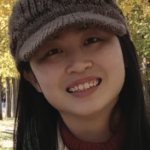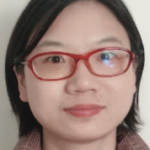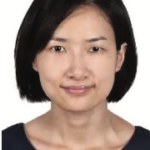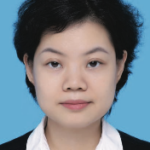University of British Columbia
University of California, Berkeley
 |
HOU Xiaoming 2022–2024 |
Hou Xiaoming is the 2022–2024 Glorisun Postdoctoral Fellow at UC Berkely. She is a scholar of Chinese Buddhism specializing in cross-cultural transmission and translation. She received her M.A. in Asian Studies from EPHE in 2015, her B.A. in French Literature, and a secondary major in Chinese Literature from Fudan University in 2013. She received her Ph.D. from EPHE/PSL (École Pratique des Hautes Études/Université Paris Sciences et Lettres) in Paris, Department of Religions and Systems of Thought, in 2022. Her doctoral research focuses on the transformation of translated Buddhist meditation teachings through the practice of exegesis in early medieval China. |
University of Hamburg
 |
Dr. Ven. Jizhao 2021 |
Ven. Jizhao received academic training at the Buddhist Academy of China (in Beijing) before going to New Delhi, India, where he obtained his M.A. degree from the Department of Buddhism Studies, New Delhi University, and a doctoral degree from the Department of Sanskrit and Indic Studies, Jawaharlal Nehru University, with a dissertation titled “A Comparative Study of Daśabhūmi: With reference to Daśabhūmikā and Mahāvastu avadāna.” He had been invited by the University of Hamburg to conduct one-year postdoctoral research in 2020, which was postponed to the year of 2021 due to the pandemic. While he was in Hamburg, he continued his research on his dissertation topic and to publish his dissertation as a book. |
Harvard University
 |
Chai Yee LEOW 2022 |
Chai Yee Leow is a postdoctoral fellow in Harvard CAMLab. She is a scholar who completed her M.A. in Buddhist Studies at Hong Kong University in 2003 and her Ph.D. in Religious Archaeology at Peking University in 2020. She is specializing in Buddhist Art, History, and Archaeology. Her Ph.D. dissertation is about Gandharan Buddhist narrative art, studying the repertoire composition and its association with Chinese Buddhist Literature. Her research focus is on the early Buddhist Art of India, China, and Central Asia, including the primary literary sources related to it. In general, she brings an interdisciplinary approach to studies in the history of Buddhism. |
Hebrew University of Jerusalem
 |
Yael SHIRI
2022 |
Yael Shiri received her Ph.D. in Religions and Philosophies from SOAS, University of London, in 2020. She is the recipient of the 2021 Khyentse Foundation Award for Outstanding Ph.D. Dissertations in Buddhist Studies. Since her graduation she was a postdoctoral fellow at the École française d’Extrême-Orient (Paris, France) and the School of Historical Studies at Tel Aviv University (Israel). Her research focuses on self-representation in Indian Buddhist literature and art, and in particular the narrative traditions of the Mūlasarvāstivādins. |
 |
Yang SHEN 2022 |
Yang Shen is a cultural anthropologist of religion and secularism. She received a Ph.D. in anthropology from Boston University in the U.S. in 2019. Before moving to Jerusalem as a Frieberg-Glorisun fellow for the academic year 2021–2022, Yang was a postdoc at the Max Planck Institute for the Study of Religious and Ethnic Diversity in Göttingen, Germany. Yang will join the Sociology Department at Zhejiang University in China as a One-Hundred Talent Researcher and Assistant Professor in Anthropology by the end of 2022. |
Peking University
 |
Hanbing LI 2020–2022 |
After completing an undergraduate degree program in Chinese Language and Literature at Northwest University in Xi’an, China, Hanbing Li pursued graduate study in the major of Ancient Chinese Literature at Nanjing University (M.A. awarded in 2011), and her M.A. thesis discussed the philosophical thoughts of Qin Guan 秦觀 (1049–1100) on the basis of analyzing his poems and other related works. She obtained a Ph.D. degree with a dissertation titled “Song Taizong, Zhenzong liangchao yicheng Mibu jing yanjiu” 宋太宗、真宗兩朝譯成密 部經研究 [Research on the Tantric Texts Translated into Chinese during the Reigns of Emperor Taizong and Zhenzong in the Song Dynasty] at Tsinghua University in 2020. Her primary field of research is Buddhist history in medieval China, with a particular focus on the period of Tang and Song Dynasty. She is currently holding a postdoctoral fellowship in the School of Foreign Languages at Peking University (2021–2022). Her ongoing research interest centers around the trend of Buddhist transmission into China during the Northern Song Dynasty. |
 |
Xi LI 2020–2021 |
Li Xi was born in Taiyuan, Shanxi in 1987. She was admitted to the History Department of Peking University in 2006 and obtained a bachelor’s degree in History in 2010. In 2010, she was sent on recommendation to the History Department of Tsinghua University for a master’s degree in Chinese history. She studied under the guidance of Professor Zhang Guogang, majoring in Sui, Tang and Five Dynasties. In 2013, she was promoted on recommendation to the doctoral program in the History Department of Tsinghua University, under the guidance of Professor Zhang Guogang, and obtained her Ph.D. degree subsequently. Starting from May 2020, she has worked as a postdoctoral fellow in the South Asian Language Department of Peking University School of Foreign Languages, with Dr. Ru Zhan as her hosting professor. Her main research interests are social life history, women’s history and Buddhist history of Sui and Tang Dynasties. Her doctoral dissertation, Medieval Buddhism, Women and Confucian Family Ethics, was selected to be an excellent dissertation by Tsinghua University in 2020. |

